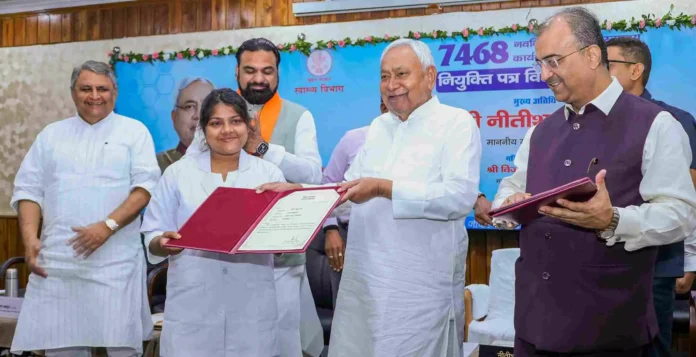Paromita Das
New Delhi, 10th July: In the dusty corridors of Patna’s Secretariat, a decision was made that could quietly rewrite Bihar’s social story for generations. On paper, it reads like another reservation policy — 35% of all state government jobs now reserved for women. But behind this number lies a deeper meaning, a message from Chief Minister Nitish Kumar to half of Bihar’s population: you belong, and you will lead.
Beyond Quotas: A Promise of Dignity
For Nitish Kumar, who has governed Bihar through decades of shifting alliances and fractious coalitions, women’s empowerment has often been more than just a vote-catching slogan. With this latest policy, his government seeks to extend a model that transformed village leadership to the corridors of bureaucracy and public administration.
Bihar was one of the first states to guarantee 50% reservation for women in Panchayati Raj institutions and urban local bodies — a radical experiment that gave millions of women, many stepping out of purdah for the first time, a seat at the table. The result? Women across Bihar now head village councils, manage funds, resolve disputes, and make their voices heard where they were once invisible.
The new 35% reservation for women in government jobs hopes to replicate that success, but in offices, police stations, and administrative halls that have remained male bastions for decades.
An Investment in Bihar’s Daughters
The policy’s fine print is straightforward — all women who are permanent residents of Bihar will now benefit from this horizontal quota in every direct recruitment drive. This means that when a young woman from a rural block appears for a state civil service exam or applies for a teaching post, her chances of landing the job have meaningfully improved.
For families in Bihar — where patriarchal norms have long dictated daughters’ destinies — this decision holds transformative power. It turns the idea of sending a girl to college from a hesitant expense into a hopeful investment. It signals to families that education for girls is not just about textbooks but about economic freedom and respect in society.
Youth Commission: A Parallel Push
In the same breath, the Nitish Kumar Cabinet approved the Bihar Youth Commission, a body meant to focus on the aspirations of the state’s restless young population. With unemployment and migration often dominating Bihar’s political discourse, the Youth Commission’s mandate — advising on jobs, skilling, and protecting local youth interests — is designed to tap into another crucial vote bank.
Together, these announcements sketch out a blueprint: one that ties the empowerment of women to the aspirations of the youth. If implemented well, they could address two of Bihar’s oldest challenges — economic backwardness and social conservatism.
The Politics of Empowerment
It would be naïve to separate this landmark move from the political calendar. With Assembly elections due in late 2025, Nitish Kumar’s latest policies are undeniably strategic. But this is not simply about wooing voters with hollow promises. If anything, the Chief Minister has built a reputation for converting policy announcements into enduring legacies. The women’s reservation in local bodies and the bicycle scheme for schoolgirls in the 2000s are proof — both reshaped Bihar’s social fabric and changed Nitish Kumar’s own political fortunes.
By coupling women’s job reservation with an increased pension for the elderly and a Youth Commission for the aspirational young, Nitish Kumar is reinforcing his identity as a leader who mixes social justice with development. Critics may call it election optics, but for lakhs of women who now see a real door opening into government service, it is nothing short of life-changing.
A Real Win or a Symbolic Gesture?
Skeptics argue that reservations alone do not guarantee empowerment. They point out that meaningful change demands safety, infrastructure, training, and a work environment where women can thrive without fear or bias. Without these supports, the new quota could risk becoming another well-meaning but hollow promise.
However, given Bihar’s track record with grassroots women’s leadership, the optimism is not misplaced. If the government backs this policy with recruitment drives, preparatory training for women candidates, and workplace reforms, the impact could echo for decades.
More Than a Number
Nitish Kumar’s 35% reservation for women in government jobs is not just a statistic for election manifestos. It is a message that Bihar — long stereotyped as backward and patriarchal — is willing to bet its future on the power of its daughters. Combined with efforts like the Youth Commission and pension hikes, this policy forms a trio of promises aimed at the backbone of Bihar’s society: women, the young, and the elderly.
The coming months will show if this vision translates from Cabinet papers to appointment letters and real salaries. But for now, Nitish Kumar has once again reminded his critics that sometimes, real change comes quietly — in the form of a number that means freedom for millions.
The post Bihar’s 35% Women’s Job Quota: Nitish Kumar’s Bold Push for Equality & Empowerment appeared first on Global Governance News- Asia's First Bilingual News portal for Global News and Updates.



